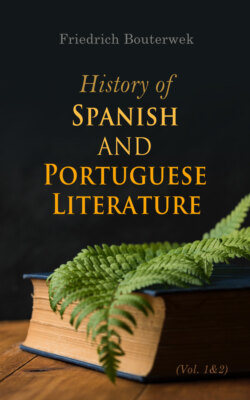Читать книгу History of Spanish and Portuguese Literature (Vol. 1&2) - Friedrich Bouterwek - Страница 29
На сайте Литреса книга снята с продажи.
JUAN DE LA ENZINA’S ART OF CASTILIAN POETRY.
ОглавлениеTable of Contents
The literature of this period possesses, however, not the slightest trace of true criticism. Though the poetical and rhetorical rules of Aristotle were known to a few scholars, they were of little utility to writers who either applied them erroneously, or considered them impracticable. Of the state of poetry in Spain, during the reign of Ferdinand and Isabella, a correct notion may be formed from a Treatise on Castilian Poetry, (Arte de Poesia Castellana,) by Juan de la Enzina. In this work, addressed to the Prince Royal of Spain, the author wished to prove that he thoroughly understood the art on which he wrote, and that he was not an unskilful Troubadour.144 The commencement of the treatise might teach the reader to expect some profound investigation. Juan de la Enzina observes, “that poetry is so excellent an art, that it merits the particular favour of princes and nobles”, who being reared “in the bosom of sweet philosophy,”145 know how to unite the virtues both of peace and war; it was therefore, he continues, his intention to write a theory (arte) of Castilian poetry, which might facilitate the distinction between good and bad. He treats of the origin of poetry among the ancients and among the Italians, and marks the difference between a poet and a Troubadour. The former, he says, is, with respect to the latter, “what a composer or learned musician is to a singer or musical performer, a geometrician to a mason, or a captain to a private soldier.”146 After all these high promises, Juan de la Enzina merely gives an Essay on Castilian prosody in a few chapters. Such is his art of poetry.
Thus did Castilian poetry and eloquence develope itself in the ancient national forms, during the first centuries that succeeded its birth, without any superior genius having either raised it to higher perfection, or enlarged its boundaries. Like the Gaya Ciencia of the Troubadours, it was a common property, protected by a literary democracy, which allowed no despotic genius to encroach upon its rights. It is difficult to imagine what might have been the fate of Castilian poetry, had not a new political connection formed between Spain and Italy, at the commencement of the sixteenth century, suddenly brought the Spanish nation, as it were in mass, in contact with the Italians. At all events, the Spaniards must, in the progress of cultivation, have ceased to be satisfied with the poetry of their old songs and romances, on their literary taste becoming in any way more refined.
